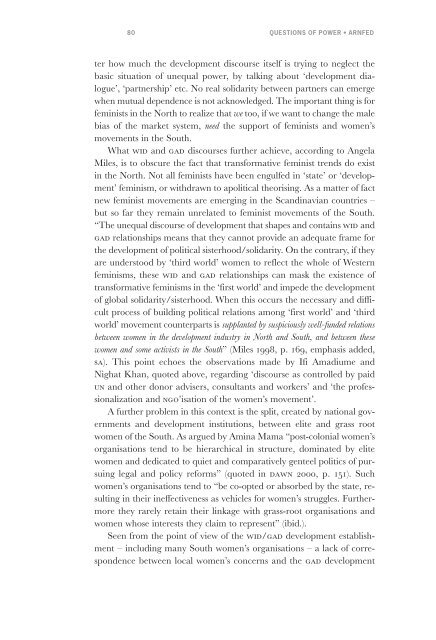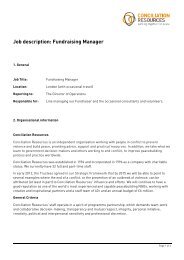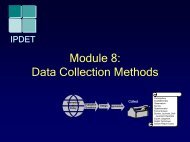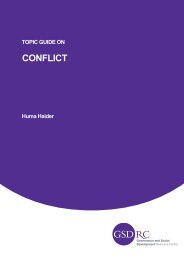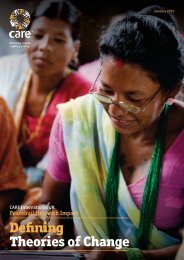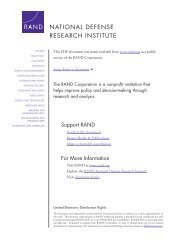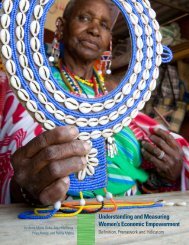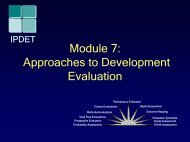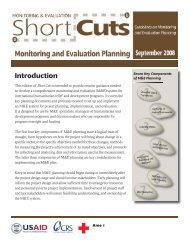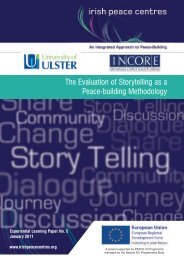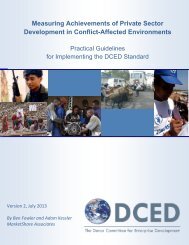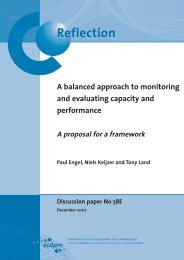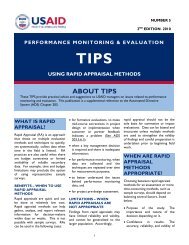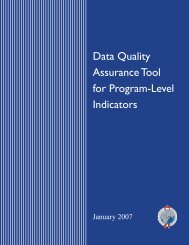Discussing Women's Empowerment - Sida
Discussing Women's Empowerment - Sida
Discussing Women's Empowerment - Sida
You also want an ePaper? Increase the reach of your titles
YUMPU automatically turns print PDFs into web optimized ePapers that Google loves.
80<br />
QUESTIONS OF POWER • ARNFED<br />
ter how much the development discourse itself is trying to neglect the<br />
basic situation of unequal power, by talking about ‘development dialogue’,<br />
‘partnership’ etc. No real solidarity between partners can emerge<br />
when mutual dependence is not acknowledged. The important thing is for<br />
feminists in the North to realize that we too, if we want to change the male<br />
bias of the market system, need the support of feminists and women’s<br />
movements in the South.<br />
What WID and GAD discourses further achieve, according to Angela<br />
Miles, is to obscure the fact that transformative feminist trends do exist<br />
in the North. Not all feminists have been engulfed in ‘state’ or ‘development’<br />
feminism, or withdrawn to apolitical theorising. As a matter of fact<br />
new feminist movements are emerging in the Scandinavian countries –<br />
but so far they remain unrelated to feminist movements of the South.<br />
“The unequal discourse of development that shapes and contains WID and<br />
GAD relationships means that they cannot provide an adequate frame for<br />
the development of political sisterhood/solidarity. On the contrary, if they<br />
are understood by ‘third world’ women to reflect the whole of Western<br />
feminisms, these WID and GAD relationships can mask the existence of<br />
transformative feminisms in the ‘first world’ and impede the development<br />
of global solidarity/sisterhood. When this occurs the necessary and difficult<br />
process of building political relations among ‘first world’ and ‘third<br />
world’ movement counterparts is supplanted by suspiciously well-funded relations<br />
between women in the development industry in North and South, and between these<br />
women and some activists in the South” (Miles 1998, p. 169, emphasis added,<br />
SA). This point echoes the observations made by Ifi Amadiume and<br />
Nighat Khan, quoted above, regarding ‘discourse as controlled by paid<br />
UN and other donor advisers, consultants and workers’ and ‘the professionalization<br />
and NGO’isation of the women’s movement’.<br />
A further problem in this context is the split, created by national governments<br />
and development institutions, between elite and grass root<br />
women of the South. As argued by Amina Mama “post-colonial women’s<br />
organisations tend to be hierarchical in structure, dominated by elite<br />
women and dedicated to quiet and comparatively genteel politics of pursuing<br />
legal and policy reforms” (quoted in DAWN 2000, p. 151). Such<br />
women’s organisations tend to “be co-opted or absorbed by the state, resulting<br />
in their ineffectiveness as vehicles for women’s struggles. Furthermore<br />
they rarely retain their linkage with grass-root organisations and<br />
women whose interests they claim to represent” (ibid.).<br />
Seen from the point of view of the WID/GAD development establishment<br />
– including many South women’s organisations – a lack of correspondence<br />
between local women’s concerns and the GAD development


